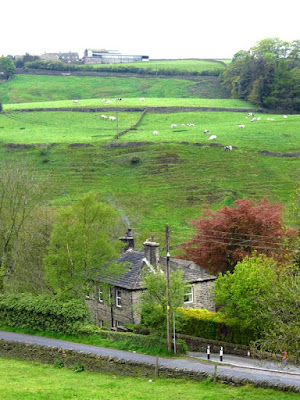
The wild beasts of Grantchester Common, England
In Douglas Adams' novel Mostly Harmless, his last novel in the Hitchhiker's Guide series, seasonal migrations takes place near the village where Arthur lives. Great beasts sweep majestically across the vast plains on their way somewhere else. When Ford Prefect arrives, he is struck by these herds of wild beasts that annually appear, and the local villager hunt to fill their storerooms with meat. This aspect of the story, along with a meeting late in the novel with a certain iconic rock musician, gives this British novel a decidedly American vibe.
Seven years after he published Mostly Harmless, Douglas Adams emigrated to the United States, and lived there for the rest of his life. Or perhaps, as an American author, I should say that he lived here.
The way Douglas Adams ended his novel, as well as the entire Hitchhiker's Guide series, left me more than a little sad. Still, I'm glad I reread this classic series. It was one I fell in love with in my teens. After decades of loving the stories Adams wrote for Doctor Who, as well as those he oversaw and shaped in his role as the TV series' Script Editor, I can appreciate his Hitchhiker's Guide novels more. The way his characters navigate the complex possibilities of space and time travel still evokes a sense of awe, which is the signature of great Science Fiction.
 |
| Trinity College, Cambridge, England |
When I visited Cambridge three years ago, I could see the town that E. F. Benson had described so lovingly in his novels Limitations and The Babe, B.A. I sensed a little of the university life that Adams' Doctor Who story "Shada" alluded to. Although I did not get to meet many students, the few I met showed an interest and respect for science. This helps me appreciate the fertile ground in which Adams' ideas were germinated.
And yet, somewhere in Cambridge, peopled by today's aspiring comedians and dramatists, is the Cambridge University Footlights Dramatic Club. Perhaps, if I ever return to the university town, I can catch a performance of the storied group known as the Footlights. It'd be interesting to see what this troupe of performers, whose membership once included members of Monty Python and Douglas Adams, is currently doing.
 |
| St John, Douglas Adams' college, Cambridge, England |
The
fact that Douglas Adams gave his final Hitchhiker's Guide novel Mostly Harmless
an American
flavor, and eventually emigrated to the United States, reminds me of how
much I
have enjoyed traveling to England, and even considered living there. It
makes me wonder if, through writing the series about exploring the
universe, Douglas Adams discovered his own love of travel, and this caused
him to consider living elsewhere. It makes
me feel a little closer to the author I never really knew, apart from
the stories he created.
Dragon Dave












